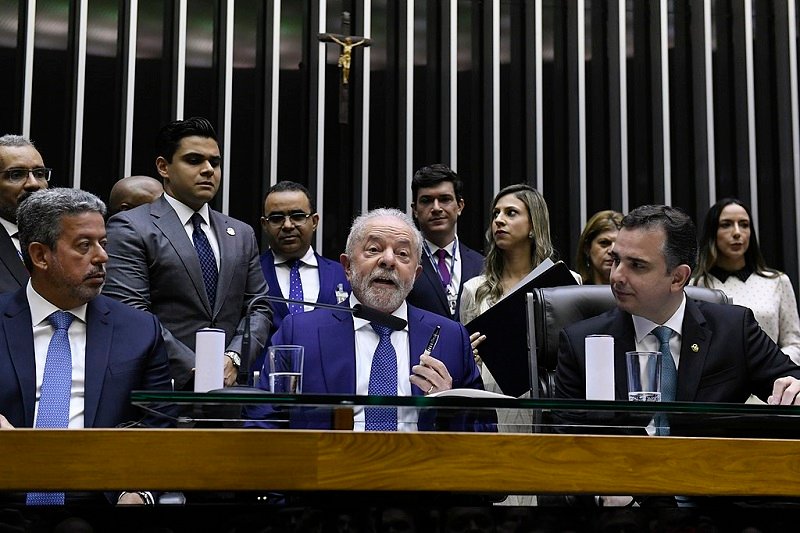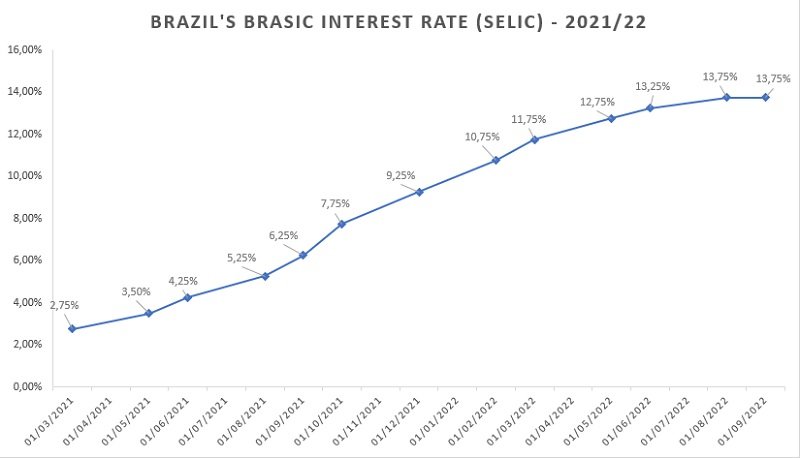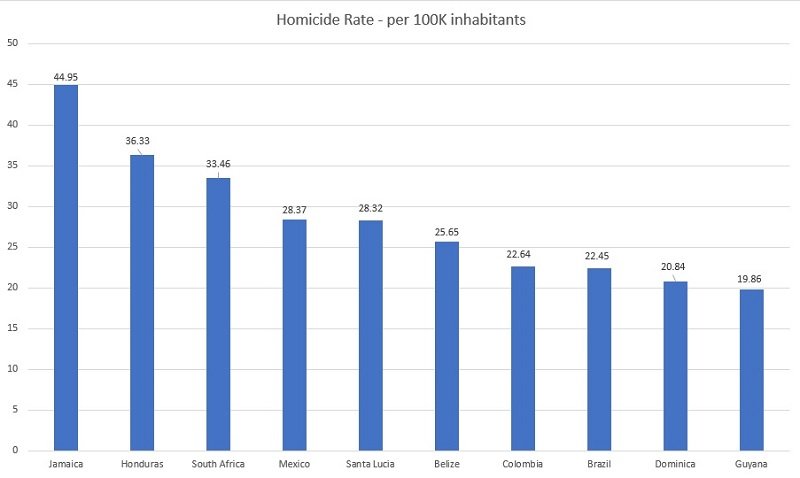On 1 January 2023, the new Federal Government began, following the inauguration of President Luiz Inácio Lula da Silva, and his Vice President Geraldo Alckmin, in Brasília. This event represents the end of a very turbulent year of intense political campaigns and violent incidents, a reflex of the extremely polarized society that came to be during the past decade. Still, the beginning of a new year, the end of the electoral period and the departure of the previous Government, does not mean the end of the political divisions, economic obstacles, and threats in the security sector that endanger social stability in Brazil. The new leaders will have to deal with many challenges, some that are already posed, others that can be seen looming on the horizon.
In the political field, negotiation and conciliation with Congress may come in handy to gather support and seek ways to govern, despite the broad opposition elected. This mission is fundamental to fulfil campaign promises, such as the continuity of the social benefits, while keeping control over an economy in deceleration with rising inflation and already very high interest rates. Remaining popular will be key for the new Government to avoid or reduce the impact of protests from the faithful opposition connected to the previous leadership – especially after they proved their capacity of mobilization through nationwide protests and road blockades.
In addition, the maintenance of the social order may also depend on the Government’s capacity to improve the crime rates, to fight the organized crime, and to implement new policies in public security.
Possibly, only by skillfully dealing with these challenges, the new Government will be able to placate the political dissatisfaction and distrust of a great part of the population that in the polls not only preferred former President Jair Bolsonaro – who received 58 million votes – but also rejected Lula.
Conciliation of Alliances and Support in the Congress
The challenges in politics began even before the inauguration. To win an extremely contested election, Lula formed a broad coalition and sealed last minute alliances, sometimes with divergent groups. During the selection of his ministers, the favors had to be retributed. However, the size and heterogeneity of this group led to internal disputes. This explains why the definition of the future ministers took so long and was completed only three days before the inauguration. It was the second longest selection.
Obstacles in the Social Democratic Party (PSD), the Brazilian Democratic Movement (MDB) and Brazil Union (UB), a group of center and right-wing parties that has 143 federal deputies (out of 513) and 31 senators (out of 81), made the composition take so long. Only on 29 December, the Workers’ Party (PT) solved the matter, by striking a deal for the leadership of nine ministries, three for each of these parties.

Nonetheless, it will still be necessary for PT to negotiate with the powerful political group known as the “Centrão” to have a support base in Congress. In the first round of this year’s elections, center-right parties won 273 of the 513 seats in the Chamber of Deputies. Bolsonaro’s PL elected 99 deputies and 13 senators, making it the largest party in both houses. Lula’s coalition will have 79 deputies in the Chamber and nine in the Senate. If all parliamentarians from the left and from the three parties support the president, he would have 287 seats in the Chamber and 47 in the Senate. The number guarantees a majority, but it is insufficient to approve amendments to the Constitution (308 and 49 votes in favor, respectively).
Furthermore, it is rare for all the congressmen to follow their parties’ alignment. For instance, the Brazil Union is the merger of the Social Liberal Party (PSL) – Bolsonaro’s former party – and the Democrats (DEM), former rival of the PT, thus many of their members may vote against the Government’s projects.
Still, the hunt for political support is far from over and the new administration will implement strategies to create new alliances. For instance, in January, the second echelon of the ministries will be negotiated with parties that were left out for now, such as the Green Party (PV), Solidarity and Avante. Moreover, analysts believe that Lula’s already proven negotiation skills can help him gain the support even from some dissidents from the Progressist Party (PP) and the Republicans, which have been close to Jair Bolsonaro’s PL.
Finally, the rejection of the “secret budget” by the Supreme Court (STF), on 19 December, may have given Lula another weapon. This mechanism was a series of legal measures allowing the Government to discretionarily hand out funds to parliamentarians for projects in their constituencies, in total opacity. Hence the nickname “secret budget”.
The STF declared it unconstitutional, leading to the split of the R$ 19.5 billion foreseen for it in 2023. Half remains under the control of Congressmen, but the other half will return to the Executive, where the amount will be distributed among the ministries. Politicians from the “Centrão” told media outlets that the resources now at the hands of the ministries will likely be used by the Federal Government as capital for political deals. Deputies and senators will have to negotiate the transfer of resources with the Government.
These conditions may provide the new Government the possibility to govern with stability, despite the fierce opposition.
If, despite all the factors above, Lula fails to obtain majority in Congress, he can become quite vulnerable to the opposition, which will likely seek to reject projects, install parliamentary inquiry commissions (CPI). This could even, end up in impeachment attempts, if there are the necessary external conditions, as it will be discussed ahead.
Control of Debts and Inflation to Address Social Problems and Attempt to Grow
In 2023, the new economic team will have to control a high basic interest rate (Selic) and a growing inflation while addressing social problems through very expensive programs, like the Bolsa Família. In addition, it must find ways to grow, generating formal jobs, and respecting the fiscal rules to contain government debts. A challenging scenario, which, if poorly addressed, may create social instability.
A boom in commodities prices, great government spending, growing global demand after the removal of social restrictions, the war between Ukraine and Russia and a strong rise in fuels prices are the major causes behind the high inflation in 2021 and 2022. The Brazilian Central Bank (BC) responded to it by increasing the country’s basic interest rate, which reached 13.75%.

The deflationary policy is behind the deceleration of the Brazilian Gross Domestic Product (GDP), which was already verified in the 3rd quarter of last year, when the GDP grew only 0.4% when compared to the same period in 2021. In 2023, analysts expect that the impact of the high interest rates will be stronger, and the economic growth shall be even smaller. According to the latest “Focus” report, released on 2 January by the Central Bank, the estimate is that the country will grow by only 0.8% in 2023. If confirmed, it will be the worst result outside the pandemic since 2016.
In this context, it will be harder to generate formal jobs without increasing Government spending. However, extra expenses mean breaching the fiscal limit, something that, if done, could affect inflationary control – forcing the elevation of interest rates – and investors’ confidence in the Brazilian economy. On top of that, to fulfill campaign promises – the payment of R$ 600 social aids through Bolsa Família and more – the President already used a lot of political capital and expanded debts with the approval of the so-called “Transition PEC”, a measure that allowed the government to increase spending by R$ 145 billion for one year.
Another challenge is to prove that the professionals appointed to guide the economy are fit for the task. Despite all the problems above, Lula chose Fernando Haddad as Economy Minister, whom he considers a close ally. However, the financial market did not like this decision. Haddad is not seen as a technical option, but a political one. Experts say that for the banks the new minister represents disregard for the fiscal rules and increase in government expenses, thus, uncontrolled debt growth.
The lack of trust from the financial market, capital flight and consecutive falls in the stock market are the momentaneous results of a still forming economic policy. Though, the market works with perspectives of future, if the effective results are positive, the scenario can be reversed, and capital will return. However, if the impacts are negative, Lula’s Government may also have to deal with protests on the streets due to inflation, as has happened in the past. If there is impact on fuels prices, truck drivers could join the movement, blocking roads and repeating the general strike of 2018. Finally, loss of popular support is the first step to an impeachment attempt, which could be prevented, if a strong political base is built in the Congress. For instance, Jair Bolsonaro managed to avoid 145 impeachment requests.
Homicides Reduction, Gun Policy, and Conflicts in the Countryside
In the field of Public Security, President Lula will benefit from a positive trend regarding the falling homicide rate across the country. According to the Brazilian Public Security Forum, the peak of homicides took place in 2017, when there were 30.9 intentional violent deaths for every 100,000 inhabitants. Afterwards, there was a downward trend, and in 2021 the rate was 22.3, a reduction of 6.5% compared to 2020. During the first nine months of 2022, this reduction continued, as violent deaths fell by 3% when compared to the same period of the previous year.
Considering the statistical results reported, one of the missions of the new administration will be the maintenance of this trend. But this might be more challenging from now on. Evidence indicate that the downward trend is slowing down, fact that was verified after results from the third quarter showed that murders increased in 17 states.

According to researchers from the Brazilian Public Security Forum (FBSP), the reduction in homicides has been caused by the creation of the Unified Public Security System, the reduction in the number of young people in the population, investment in police forces, and the dynamics of organized crime – after the 2017 gangs’ war, a truce has prevailed. Since in Brazil, most homicides are connected to gang disputes, by reducing violence between criminals, the government can advance on its journey to leave the top positions on the ranking of most violent countries. Data form 2021 provided by the United Nations Office on Drugs and Crime (UNODC), showed that even after this positive result in the last years, the country is still the 8th most violent in the world.


Another hot topic for the next Government is the flexibilization of rights to acquire firearms implemented by former President Bolsonaro, to which he attributed the reduction in murders. For the previous Government, this policy improved public security by giving citizens a way to defend themselves. However, experts say that more guns pose a greater risk to society and consequences are seen between two to three years after the flexibilization. Moreover, cases of gun traffickers using legal licenses to resell firearms and ammunition to criminals were discovered. In addition, new incidents of active shooters, and threats with weapons were reported.

The illegal activities and associated conflicts in the rural regions of Brazil, in the indigenous reserves, and in the Amazon have also a great potential to be a source of trouble. According to media sources, in the last four years, various regulatory institutions reduced their control over these regions, where illegal mining, logging, hunting and land expansion activities quickly developed. This led to increasing violent conflicts between outlaws and indigenous people and conservationists. Furthermore, social movements, with intense presence in rural areas, such as the Landless Workers’ Movement (MST), may feel more politically confident to carry out activities, such as land invasions, leading to fights with landowners. This possibility was even announced by MST’s main leader João Pedro Stedile who stated before the election that “mass mobilizations” could resume if Lula was victorious.
Another task for the newly inaugurated leadership will be in terms of building relations with the security forces and removing political supporters of the former administration in strategic positions. Coming from the Army, Bolsonaro rose in politics by receiving many votes from the police and military personnel. In his government, thousands among them gained positions and were benefited. In addition, his way to govern was well seen by the military forces. Hence, to accomplish an efficient management of the public security, Lula will likely have to establish good connections and remove any eventual resistance from sectors that got politically involved with Bolsonaro’s government. Some of the results of this lack of support by the security forces were seen during protests carried out by supporters of Bolsonaro, in which police forces were lenient with violent acts.
Overcoming Popular Resistance
The continuous protests that were carried out after Bolsonaro’s defeat from 31 October until now show the extension of his popular support. In the beginning, truck drivers from across the country blocked federal roads and spread fear of shortages. According to media sources, after a few days and complaints of prevarication against the Federal Road Police (PRF) and the Military Police (PM), accused of being tolerant and showing support to protesters, the roads began to be cleared.
When the movement on the highways lost force. Thousands of protesters moved to camps set in front of military facilities. Just like those on the roads, they did not accept Lula’s victory and demanded a military coup to maintain Bolsonaro in charge of the country. Investigations approved by the Supreme Court (STF) revealed signs of funding by businessmen, in particular, from the farming sector.
Moreover, in front of the barracks, protesters were not removed by the Armed Forces, which have jurisdiction around their bases. For Political commentators, this unveils an indirect support by the military.

The events described are a portrait of the strong popular opposition Lula already faces since the beginning. Even though elected, he was rejected by a great part of the population, which in the past 20 years moved from an anti-Workers’ Party sentiment (“Antipetismo” – reference to Lula’s party, PT) to a right-wing movement that gained cohesion through Bolsonaro’s leadership; thus, it was named “Bolsonarismo”.
The protests that took place after the election were promoted by pro-Bolsonaro, or “Bolsonaristas”, which is supported by sectors of the middle class, the agribusiness, the evangelical churches, the security forces, among others. Such resistance is a sign that bad economic management and weak political alliances can quickly provoke civil unrest by the popular base of the opposition.




